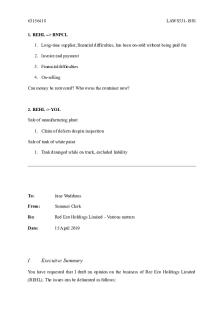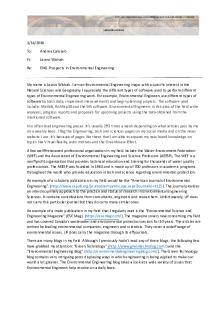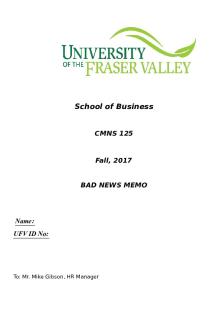Memo assignment PDF

| Title | Memo assignment |
|---|---|
| Author | Jared Harris |
| Course | Administrative Law |
| Institution | University of Manitoba |
| Pages | 10 |
| File Size | 264.4 KB |
| File Type | |
| Total Downloads | 85 |
| Total Views | 130 |
Summary
Mandatory memorandum assignment
...
Description
63156418
LAWS331-19S1
1. REHL --> BNPCL 1. Long-time supplier, financial difficulties, has been on-sold without being paid for. 2. Invoice and payment 3. Financial difficulties 4. On-selling Can money be recovered? Who owns the container now?
2. REHL -> YOL Sale of manufacturing plant 1. Claim of defects despite inspection Sale of tank of white paint 1. Tank damaged while on truck, excluded liability
To:
Jane Waddams
From:
Summer Clerk
Re:
Red Eco Holdings Limited – Various matters
Date:
15 April 2019
I
Executive Summary
You have requested that I draft an opinion on the business of Rec Eco Holdings Limited (REHL). The issues can be delineated as follows:
63156418
LAWS331-19S1
First, whether REHL are able to recover payment for the container load of acrylic polymer which has been supplied to the Blue Natural Paint Company Limited (BNPCL), and which has not been paid for due to financial difficulties at BNPCL; and Second, whether REHL are responsible for the loss incurred when damage occurred to property in transit, which was being delivered to its purported buyer, Yellow Organics Limited (YOL).
First Issue - BNPCL The first part of this issue centres around In order to answer the first issue, it must be established whether the container of paint barrels ordered by Blue Natural Paint was ascertained goods, whether property in the goods had legitimately passed to BNPCL, and whether they are now recoverable having been on-sold to a third party. Ascertainment The law on ascertainment requires that goods must be identified and agreed on after formation of the contract between the parties. In the case of the white interior paint, the goods can clearly be identified as the paint that was within the storage tank at the time. 1 Both parties clearly expressed intent that the paint within the tank was the goods in question. In Re Goldcorp Exchange Ltd (in receivership) [1995] 1 AC 74. Even if the goods had not been ascertained in the communications between the parties, they became ascertained when they became identified and connected to the contract, with the consent of both parties. Has property passed? Turning to whether the property has passed to BCPL, the initial common law test examines whether the parties intended the property to pass. The express intention in this case can be found in the Supply Agreement, which at clause 5 states that property will pass upon payment. No payment has been transferred in this transaction, as stated by Sarah Hope in her email. This indicates that good title in the property has not passed to Green Investments Limited. Sale to third party
1 Re Wait [1927] 1 CH 606 at 611.
63156418
LAWS331-19S1
Finally, it must be established whether the goods can be recovered from Green Investments Limited (GIL), who they were on-sold to. In general, goods cannot be given by those who do not legitimately possess the title – the rule of nemo dat quod non habet. However exceptions do exist in the Act. However, an exception exists if the goods are received in good faith. 2 This exception may apply here as there is no evidence that GIL received the documents in bad faith or were aware of any issues or discrepancies around the goods they received. The goods may be recoverable by estoppel if they were not accepted in good faith by GIL from BNPCL. In this case, GIL never acquired good title over them. Financial difficulties Additionally, if BNPCL passes into receivership, REHL may become a creditor. In this case they should notify any appointed liquidators, including by sending invoices.
Second Issue – YOL The second issue revolves around whether the sale of the plant and the associated quantity of paint which was sold to Yellow Organics Limited. The Is a merchantable quality available? 138 (3) ? However, in the case of a contract of sale for a specified article under its patent or other trade name, there is no implied condition that the article is fit for any particular purpose. In this case, the paint manufacturing equipment was sold under its trade or patent name, as Josh described it in his first email as an FFT-15000 paint manufacturing system which we can reasonably assume is its trade name. Prima facie it may appear that BNPCL may be able to rely on s 138(3), however case law has red the proviso down significantly. In Taylor v Combined Buyers,
2 Contract and Commercial Law Act 2017, s 153.
63156418
LAWS331-19S1
Particular Purpose of the Paint Manufacturing Equipment YOL may wish to claim that the implied purpose of the paint manufacturing machine was to manufacture paint – ideally, for more than 100 hours of operation which could be construed as less than reasonable. As such, the internal defects of the machine constitute a breach of contractual representations and a breach of s 138 of the CCLA provides protection for buyers when a seller of goods is expected to exercise judgement and skill in acquiring the goods which they sell. Merchantable quality YOL may also claim that the machine is not of merchantable quality, having what they claim is an inherent defect. This claim would be made on the grounds of s 139. Two conditions must be met in situations where the buyer of goods has inspected the goods prior to purchase, as has happened in the case of YOL and the paint machine. The first condition is whether the seller deals in goods of that particular description. Per the emails of Josh, it appears clear that they do so. The second condition, set out in s 139(2), states that when the buyer has examined the goods, they cannot claim an implied condition that the goods are free from defects which the buyer ought to have noticed during their examination of the goods. In Thornett, this section is interpreted as meaning what defects an objectively reasonable examination ought to have revealed. Being an internal defect with the agitator, it may not have been visible during the visual inspection – however, the agitator is clearly an intrinsically important part of the machine and it could be equally argued that an objectively reasonable assessment of the machine ought to have included an inspection of that part – especially with the knowledge that the machine was twelve years old and in a used state. However, it remains possible that merchantable quality may be considered. S 139(2) has also been interpreted in a less strict manner in Frank v Grosvenor Motor Auctions, which states that only the defects which ought to have been found in the inspection should be excluded. Using this test, it could be argued that YOL did not have an in-depth opportunity to use the machine, or to disassemble and inspect it thoroughly – although this preference for a cursory inspection appears to have been entirely of YOL’s own volition. More information about the inspection process,
63156418
LAWS331-19S1
Limits of merchantable quality are defined by the terms of the contract for the sale of the goods. We do not have any written formalised contract for the sale of the plant and paint – merely the email chain between YOL and BNPCL. If we assume that there was no other contract or other communications, then we can glean from the email the supposed purpose of the sale which was to manufacture paint at YOL. This purpose would be severely undercut by the broken agitator. However, the lack of express purpose may lower the threshold for standards of merchantable quality. The machine is still in a somewhat working state, and this may be enough to satisfy the test of merchantable quality where the threshold has been somewhat lowered by the lack of a written contract of sale. In Henry Kendall & Sons, it was stated that goods must be able to perform at least one of the duties for which they are sold for the purpose of.3 Using this approach, the machine would be considered as merchantable as it can perform the most basic duties it was sold for – however, not for very long. Value and condition of the goods can also be considered when establishing merchantable quality of goods
In this case, the certainty of goods was clearly anticipated. The white interior paint was identified as that sitting surplus in a storage tank, rather than paint from anywhere within the inventory of the business. The paint manufacturing plant itself was ascertainable because it was the only one of its kind and clearly described and known to both parties before and during the formation of the contract.
II
Facts
BNPCL-REHL Supply Agreement
3 Henry Kendall & Sons v William Lillico & Sons Ltd [1969] 2 AC l1 at 77 per Lord Reid.
63156418
LAWS331-19S1
BNPCL are in an ongoing supply with agreement which REHL (trading as Planet Paint) which is dated 5 September 2015. Per this agreement, BNPCL is obliged to make payment on the 20th day of the month following the month of the invoice being issued. The container ordered would likely fall under the auspices of this agreement. YOL-REHL Sales Two sales occurred between REHL and YOL. The first was the sale of the paint manufacturing machine, and the second was the sale of the amount of paint that was left in the
During transportation, that machine was damaged and can no longer be used safely due to damaged safety features. At the same time, the purchased paint was spilled onto the road and destroyed. As such, YOL is refusing to pay for either the paint or machine. YOL has also alleged that the machine had also suffered damage from prior use, which makes complete failure likely in the imminent future. In order to remedy this inherent defect, YOL alleges that a replacement part would cost approximately $25,000. As such, they reject the machine for not conforming to the contract and demand that REHL remove it from their premises.
III
Legal Issues
Exclusion of liability of Black Carriers Limited Black Carriers Limited (BCL) have included an exclusion of liability clause in the contract between themselves and BNPCL. This exclusion is broad and purports to
YOL confirmed in an email dated February 21 that they had ‘a look’ at the machine prior to deciding whether to purchase it. It can be assumed that they are an experienced paint business which ought to know the risks associated with purchasing second hand equipment. A visual inspection of the goods
63156418
LAWS331-19S1
Milne Construction Ltd v Expandite Ltd [1984] 2 NZLR 163
139
Implied condition that goods are of merchantable quality (1)
(2)
There is an implied condition in a contract of sale that the goods are of merchantable quality if the goods are bought by description from a seller who deals in goods of that description (whether or not the seller is the manufacturer).
However, if the buyer has examined the goods, there is no implied condition with
respect to defects that the examination ought to have revealed
A
Sale of acrylic polymer to BNPCL
B
Sales to YOL
IV
Conclusion
A
BNPCL
B
YOL
The machine cannot be returned as it has The risk passed to YOL
Word Count: 1234
Blue Natural Paint delivery and payment 5. Invoice and payment 6. Financial difficulties
63156418
LAWS331-19S1
7. On-selling Sale of manufacturing plant 2. Claim of defects despite inspection Sale of tank of white paint 2. Tank damaged while on truck, excluded liability Remedies Insurance Are they the owners at time of sale? IV Legal Issues
Pongakawa Sawmill v New Zealand Forest Products Ltd [1992] 3 NZLR 304
10
Passing of risk and title The risk of the logs shall pass to the purchaser on delivery at the point of delivery. The title to the logs and/or produces made from those logs shall not pass to the purchase until payment in full for the logs has been made.
Risk CLINZ 13.5
148
Risk passes with property unless otherwise agreed (1)
(2)
Unless otherwise agreed,— (a)
goods remain at the seller’s risk until the property in the goods is transferred to the buyer; but
(b)
when the property in the goods is transferred to the buyer, the goods are at the buyer’s risk (whether or not delivery has been made).
However, if delivery has been delayed through the fault of either the buyer or the seller, the goods are at the risk of the party at fault with respect to any loss that might not have occurred but for the fault.
63156418
LAWS331-19S1 1908 s 22
Sterns Ltd v Vickers Ltd [1923] 1 KB 78 Donaghy’s Rope and Twine Co Ltd v Wright Stephenson & Co (1906) 25 NZLR 641
Perishing of goods CLINZ 13.6
127
Contract void if goods have perished at time when contract is made A contract of sale for specific goods is void if the goods, without the seller’s knowledge, have perished at the time when the contract is made.
Example A person (A) sells 100 tonnes of table potatoes to another person (B). Without A’s knowledge, the potatoes, at the date of the contract, had become unfit for human consumption because of second growth. The contract between A and B is void. 1908 s 8
128
Contract void if goods perish before sale but after agreement to sell (1)
This section applies if there is an agreement to sell specific goods and, subsequently, the goods, without any fault on the part of the seller or the buyer, perish before the risk passes to the buyer.
(2)
The agreement becomes void when the goods perish. 1908 s 9
Oldfield Asphalts Ltd v Grovedale Coolstores (1994) Ltd [1998] 3 NZLR 479 per Gallen J at 491:
[T]he term “perish” must be interpreted as meaning not that the goods concerned should have been physically destroyed, but that the nature of the goods should have been so affected by the supervening incident that they have ceased to have those qualities which led to the parties entering into the contract for their disposition. The question then in each case as to whether or not the subject-matter of the contract can be said to have perished, will be one of degree.
63156418
LAWS331-19S1...
Similar Free PDFs

Memo - Business Memo Assignment
- 2 Pages

Memo assignment
- 10 Pages

Memo 1 - Memo 1 Assignment
- 2 Pages

TWC Assignment Memo 2 and Memo 4
- 4 Pages

Topics Memo Assignment Sheet
- 1 Pages

Informative Memo Assignment
- 3 Pages

direct memo assignment
- 2 Pages

Memo - Memo
- 2 Pages

Email and Memo Assignment 2020
- 4 Pages

Memo - Memo for stocks
- 2 Pages

Laptop Memo - BIT-200 Memo
- 2 Pages
Popular Institutions
- Tinajero National High School - Annex
- Politeknik Caltex Riau
- Yokohama City University
- SGT University
- University of Al-Qadisiyah
- Divine Word College of Vigan
- Techniek College Rotterdam
- Universidade de Santiago
- Universiti Teknologi MARA Cawangan Johor Kampus Pasir Gudang
- Poltekkes Kemenkes Yogyakarta
- Baguio City National High School
- Colegio san marcos
- preparatoria uno
- Centro de Bachillerato Tecnológico Industrial y de Servicios No. 107
- Dalian Maritime University
- Quang Trung Secondary School
- Colegio Tecnológico en Informática
- Corporación Regional de Educación Superior
- Grupo CEDVA
- Dar Al Uloom University
- Centro de Estudios Preuniversitarios de la Universidad Nacional de Ingeniería
- 上智大学
- Aakash International School, Nuna Majara
- San Felipe Neri Catholic School
- Kang Chiao International School - New Taipei City
- Misamis Occidental National High School
- Institución Educativa Escuela Normal Juan Ladrilleros
- Kolehiyo ng Pantukan
- Batanes State College
- Instituto Continental
- Sekolah Menengah Kejuruan Kesehatan Kaltara (Tarakan)
- Colegio de La Inmaculada Concepcion - Cebu




